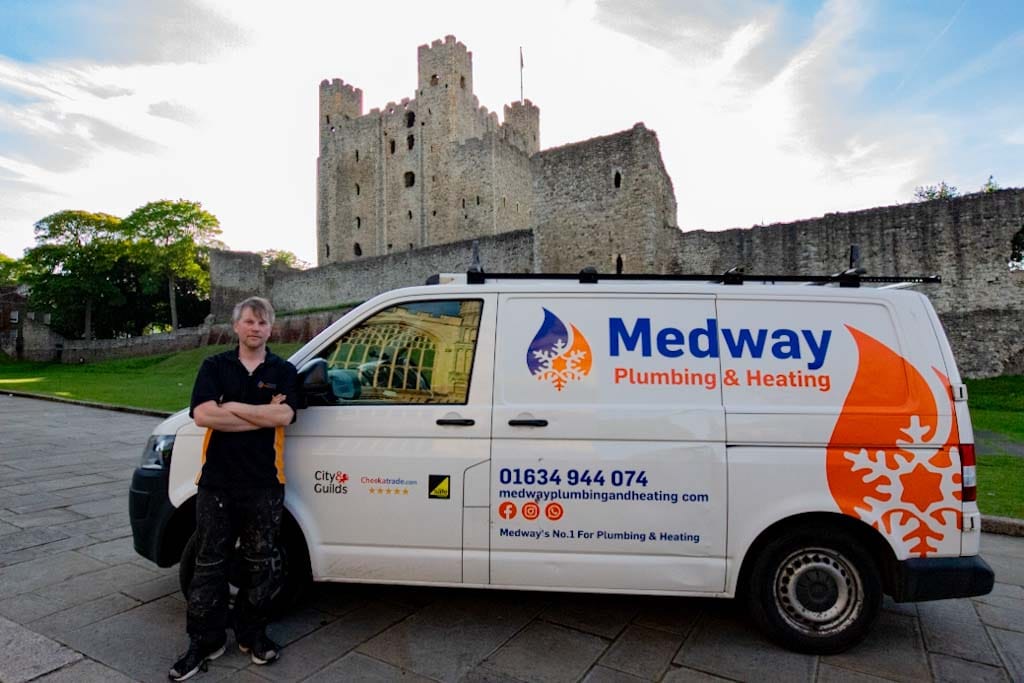Have you got a heating or plumbing question that you would like answered ASAP?
At Medway Plumbing & Heating, we have heating and plumbing experience which spans nearly 20 years. That means we’ve pretty much heard it all when it comes to customer plumbing questions.
In this blog we offer straightforward, expert answers to five of the most common plumbing questions customers ask. And, of course, if there is anything else which you need to know, just give us a call – we’re always happy to help.
Question 1: “How Do I Bleed a Radiator?”
Answer: The question how to bleed a radiator is an extremely common one because it is a great way to ensure your heating system is running at maximum efficiency by releasing trapped air that prevents it from heating properly. It might be that your radiators are only heating at the bottom or have cold spots – in this case, bleeding your radiator is a great solution and here’s how.
To bleed your radiator:
1. Turn off your heating and wait until the radiator is cool
2. Place a cloth under the radiator valve and use a radiator key to turn the valve slightly until you hear air hissing out
3. When water begins to flow steadily, close the valve
4. Be sure to check your boiler’s pressure after bleeding and top it up if necessary.
● Follow-Up Tip: This one is an easy win as you can bleed a radiator at home without the need for professional assistance. All you need is a radiator bleed key, which you can pick up from any plumber’s merchant or online.
Question 2: “Why Does My Boiler Keep Losing Pressure?”
Answer: If your boiler keeps losing pressure then sometimes the problem may be more simple to fix than you might think, or it might mean that professional assistance is required. Potential boiler pressure problems include the following:
○ Leaks
A leak in the system can cause your boiler to lose pressure. To check for leaks, inspect visible
pipes and radiators, and monitor the pressure over a few days. If in doubt, ask a professional heating and plumbing expert for advice.
○ Faulty pressure relief valve
A faulty pressure relief valve (PRV) can cause a continuous flow of water to run through the
valve, which can lead to a loss of pressure. You can check the safety discharge pipe, which is
usually located outside on the wall where your boiler is installed, for signs of dripping or leaking water.
○ Expansion vessel issues
If your boiler keeps losing pressure after topping it up, there may be a problem with the expansion vessel. You can try recharging the expansion vessel by pumping it up, but if the inside of the vessel is split, it will need to be replaced.
○ Faulty pressure gauge
A pressure gauge can break due to mechanical failure, blockages from debris or sludge, or leaks in the system.
○ Radiators need bleeding
Bleeding radiators releases air from within them, which can reduce the pressure in your boiler
system. Read the FAQ above on how to do this.
● Follow-Up Tip: While minor fluctuations are normal and the solution may be as simple as repressurising the system, persistent low pressure usually signals a problem. If you can’t
identify a cause, it’s best to call a professional to inspect the system to resolve the issue safely.
Question 3: “Why Does My Toilet Keep Running?”
Answer: A running toilet is often caused by issues with the flapper, fill valve, or float.
○ Flapper
Start by checking the flapper to see if it’s sealing properly. If it’s worn out, consider replacing it.
○ Float
You can also adjust the float to ensure the correct water level in the tank.
○ Fill valve
The valve is a rubber seal that sits at the bottom of the toilet tank and prevents water from flowing into the bowl until you flush. If the valve is not sealing properly, water will continuously leak into the bowl, causing the toilet to run. If these fixes don’t work, the fill valve may need replacing, which a plumber can do for you.
● Follow-Up Tip: To have this taken care of professionally call an expert plumber in to get the job done properly. Get in touch with a member of the team today.
Question 4: “Where Is My Stopcock?”
Answer: The stopcock is usually located where the water main enters the property – often under the kitchen sink or in a utility cupboard. It’s a key valve for turning off the water supply in an emergency, so it’s good to locate it ahead of time. Turn the handle clockwise to shut off the water, and anticlockwise to turn it back on.
● Follow-Up Tip: If you’re unsure where your stopcock is, then ask your neighbours if they live in houses built at a similar time to yours, or ask your friendly neighbourhood plumber next time you see them. Finding out now can save you a lot of money and damage in the case of a serious leak.
Question 5: “How Can I Maintain a Healthy Boiler?”
Answer: Keeping your boiler in good condition involves regular checks and servicing. Annually, it’s best to schedule a professional service, which will include checking the pressure, inspecting for leaks, and cleaning components. You can also monitor pressure, bleed radiators when needed, and keep the area around the boiler clear. Regular maintenance ensures efficiency, longevity, and safety.
● Follow-Up Tip: For more details on how to maintain a healthy boiler, take a look at our handy guide.
These simple steps can help prevent or fix common plumbing issues but we are always available to assist if you need help or professional advice.
Still have plumbing questions? Get in touch with Medway Plumbing & Heating today. Our team is here to help with everything from minor fixes to major installations.

